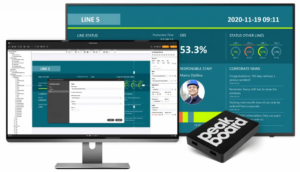Understanding Charge and Capacity:
Battery charge, also known as the state of charge (SoC), indicates the current energy level in the battery compared to its full capacity. It is typically expressed as a percentage and helps determine how much longer a battery can operate before needing a recharge. Battery capacity refers to the total amount of energy a battery can store, measured in ampere-hours (Ah) or watt-hours (Wh). This value indicates the battery’s maximum potential and degrades over time due to factors such as usage cycles, temperature, and charging practices. Understanding both SoC and capacity is fundamental for managing energy resources effectively, especially in critical industrial operations.

Importance of Accurate Measurement:
Optimizing battery performance starts with accurate measurement, which helps in several key areas: Preventing overcharging and deep discharging, predictive maintenance, enhancing efficiency and safety, and cost management. These benefits reduce replacement costs, improve operational reliability, and extend battery life.

Best Practices for Measuring Charge and Capacity:
- Use Precision Instruments:
Accurate measurements require high-quality equipment. Logicbus offers advanced multimeters, battery analyzers, and data acquisition (DAQ) systems that capture real-time data with high accuracy. These instruments are designed to handle the rigors of industrial environments, ensuring reliable readings. - Conduct Regular Testing:
Regular capacity testing under controlled conditions is crucial for assessing the health of the battery. This involves fully charging and discharging the battery to determine its actual capacity compared to the manufacturer’s specifications. Periodic testing helps detect early signs of capacity degradation. - Monitor Temperature Impact:
Battery performance is highly sensitive to temperature variations. High temperatures can accelerate capacity loss, while low temperatures can reduce efficiency. Integrated temperature sensors and thermal management systems help account for these changes, allowing for more accurate measurements. - Implement Data Logging and Analysis:
Continuous data collection allows for comprehensive analysis over time. Logicbus provides advanced data logging solutions that record key metrics such as voltage, current, and temperature. This data can be visualized through intuitive software tools, helping operators detect trends, predict failures, and optimize performance.
Logicbus Solutions for Battery Measurement:
Measurement of Charge and Capacity in Battery Systems:
Logicbus offers a comprehensive system for real-time monitoring and analysis of battery charge levels, discharge rates, and capacity. This system provides precise measurements and insights that support battery performance optimization, lifespan prediction, and safety assurance.
Monitoring Current and Voltage:
The Seneca T201DC and Z-LTE-WW modules measure voltage, current, and power in battery systems. These highly accurate meters are designed for DC energy monitoring, essential for evaluating modern battery systems. Data from these devices is transmitted to a centralized hub for real-time analysis, ensuring accurate SoC and Depth of Discharge (DOD) calculations.
State of Charge (SOC) and Depth of Discharge (DOD) Calculations:
The Z-LTE-WW module processes sensor signals to calculate SOC and DOD in real-time. This data helps operators understand the remaining battery capacity and plan usage accordingly.
Temperature and Environmental Monitoring:
The system integrates DL-10 temperature and humidity sensors to monitor environmental conditions, ensuring optimal battery operation and safety. These sensors prevent overheating and detect inefficiencies caused by temperature fluctuations.
Centralized Visualization and Control:
The Peakboard Industrial Visualization System displays real-time battery performance data, such as charge levels, discharge rates, and environmental conditions, on a user-friendly dashboard. This allows operators to monitor the system at a glance and respond to anomalies promptly.
Data Logging and Historical Analysis:
Data is logged and stored in the Peakboard Box or Peakboard Cloud, enabling historical analysis of battery performance trends. This information is critical for identifying performance degradation, predicting lifespan, and planning maintenance.
Manual Control and Adjustments:
On-site operators use the Davo D-8605 Industrial Keyboard for manual input, system calibration, and adjustments during maintenance activities.
Safety Alerts and Alarms:
The Z-LTE-WW module includes alarm capabilities to send warnings when batteries exceed safe operational limits, such as overheating or overcharging. Alerts can be sent via email or integrated into SCADA systems for remote monitoring.
Remote Monitoring and Cloud Integration:
The system supports integration with SCADA platforms (e.g., CIMON SCADA) and cloud services for remote monitoring and control via API. This feature provides access to battery performance data from multiple systems, enhancing operational efficiency and flexibility.
Conclusion:
Measuring battery charge and capacity accurately is essential for optimizing industrial battery systems and ensuring reliable performance. By following best practices and utilizing advanced tools from Logicbus, industries can prevent failures, extend battery life, and improve overall efficiency. With high-precision instruments like the Seneca T201DC, Z-LTE-WW, and integrated solutions such as Peakboard and DL-10 sensors, Logicbus provides a comprehensive suite of tools to streamline battery management. These solutions enable real-time monitoring, predictive maintenance, and enhanced safety, helping businesses reduce costs and enhance operational reliability.
sales@logicbus.com | support@logicbus.com | +1 619 616 7350 | Start conversation






